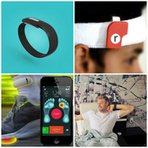
People don't like to be reminded they're sick. That's one reason why tomorrow's health gadget needs to look more like a smartphone than a clunky medical device
Medical device makers will need to be as innovative as consumer gadget companies to stay competitive as the market is increasingly influenced by the demands of patients and hospitals moving toward patient-centered care.
The demand for greater innovation partly reflects consumer interest in proactive health management with monitoring devices such as the Fitbit, and partly reflects changing incentives for hospitals and healthcare providers to be more attuned to delivering positive outcomes, not just billing for visits and procedures, said Chris Wasden, global healthcare innovation leader at PricewaterhouseCoopers LLP. "They're saying, 'If I'm only going to get paid for outcomes, I only want to pay you for outcomes.'"
In many cases, what this means is that the product needs to be more than a device alone; connections to websites, apps, and monitoring services become important. Even products such as pacemakers have wireless communications capabilities, which can be used to report data that can be shared with a provider's electronic health records system as well as a self-care dashboard for the patient, Wasden said. When providers are compensated on improving outcomes, they need to be able to document those improved outcomes, which is where device connectivity becomes important, he said.
by Shane Turner via NursingFacultyJobs.com
No comments:
Post a Comment